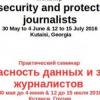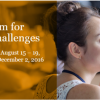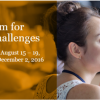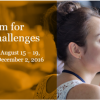The Summer School is organised by the Centre for Media Pluralism and Media Freedom (CMPF) at the Robert Schuman Centre for Advanced Studies of the
Narrative Journalism
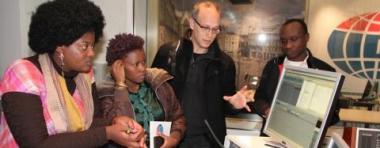
Journalism without story has much less impact. Modern journalists need to be great storytellers because they tell important stories. Narrative journalism teaches journalists to tell the important stories in a country – it is one of the keys to accountability, transparency and democracy.
Traditional journalism training focuses on information, not stories. Just giving information is not sufficient in the 21st century with all the platforms available for disseminating news. Journalism based on Who, What, Where, Why, When and How, and classic journalism training using a very narrow range of ways of reporting will leave your news items having much less impact.
This two week course combines RNTC’s unique modules of story, formats and creativity giving participants all the tools they need to tell great stories in thousands of different ways, enabling journalists to take their story-telling skills to an international level. The theories are then applied specifically to the producing of news items in any medium and of any duration, with practical exercises and assignments requiring you to craft great stories in many different ways. Tutors include experienced BBC and international journalists and great factual storytellers in many media and on many platforms.
This course is suitable for journalists and media professionals who have or want to produce important factual stories, that really make an impact, especially for accountability and transparency, in any medium. Suitable for people working in all media (audio, video/TV/film, print, online, photography, social media.
Course outline
Breaking the dominance of information-lead reporting, to deliver important information in story form.
Advanced story theory including the crafting of single and multiple storylines within journalistic items.
Working creatively with formats to provide huge choices of how to tell the great stories you’ve uncovered.
Introduction to Learning and Persuasion theories that ensure you craft the emotional journey for your audience, not just the information.
Getting clear and precise aims and target audiences for your items, articles and programmes. When you know who you’re making it for and why, you can get the tone, style and tempo right.
Building confidence and competence in analyzing the story you are building and improving the story with every new draft or edit.
Advanced understanding and use of symbols and their key role in telling factual stories.
International parameters of ethical, verified story research and journalistic integrity.
Admission requirements
Applicants must meet the following requirements:
You are currently working as a media professional and have a minimum of three years working experience
Your speaking and writing skills in English (the course language) are sufficient (see below)
You submit a motivation in English (150-250 words) explaining the reasons for applying for the course, its relevance to your work and that of your organisation, and its potential contribution to enhancing the performance and the capacity of both
To complete our admissions requirements at the beginning of the course we need to see the original (or if you prefer a properly certified copy) of your most recent educational qualification in secondary or higher education. Please make sure you bring this with you since we will ask to see it on the opening day of the course.
English language proficiency
Since English is the working language of our courses, we need to be sure that your English is good enough. If you come from a country where English is the official/national language or if English was the language in which you took higher education, your spoken and written English will be good enough. In both these cases you don't need to give us any proof of proficiency.
In all other cases we will need a certified statement from a recognized authority establishing your proficiency in spoken and written English. The required level of your command of English should be equivalent to a TOEFL score of 550 (paper-based) or 213 (computer-based), and 6 for IELTS. In case of doubt we may conduct a telephone/Skype interview.
Fees, costs and scholarships
Course fee
EUR 1,899
The course fee includes pick-up from the airport, insurance, and travel assignments. Participants must cover their own costs of travel, accommodation and meals. More information on costs can be found here.
All in fee
EUR 3,099
The all in fee includes pick-up from the airport, insurance, travel assignments, accommodation, meals, pocket money and travel between accomodation-RNTC. More information on costs can be found here.
Scholarships
The scholarship application deadline is 25 March 2016.
Please note that the deadline for sending in your RNTC application is Thursday 24 March 12.00 CET. Only then we can guarantee that we can evaluate your application and (if you are eligible for the course) can send you the link to apply in ATLAS; the online system for your NFP or MSP scholarship application. The deadline for applying in ATLAS is Friday 25 March 24.00 C.E.T. Support from our office is available until Friday 25 March 17.00 hours C.E.T. Also check the NFP and MSP application procedure.


